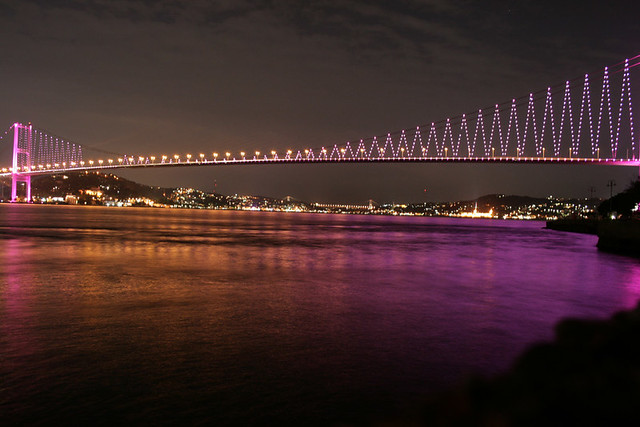 Istanbul’s incandescent Bosphorus Bridge will join iconic structures around the world in turning off its lights for Earth Hour this year.
Istanbul’s incandescent Bosphorus Bridge will join iconic structures around the world in turning off its lights for Earth Hour this year.
For the past four years, Istanbul’s majestic Bosphorus Bridge has been lit all night long by an LED display that consumes electricity at a rate of 90 kilowatts. (That’s roughly 400 megawatt-hours per year, which is approximately the amount of energy consumed by 200 average Turks, according to the U.S. Energy Information Administration.) But tonight, its glittering reflection will disappear from the Bosphorus — for one hour.
The bridge will fall dark in honor of Earth Hour 2011, a four-year-old tradition established by the WWF to raise awareness about the urgent need to conserve energy and thereby cut back on greenhouse gas emissions, the leading contributors to climate change.
This tribute to energy-efficiency is sorely needed in Turkey, where greenhouse-gas emissions rose by approximately 120 percent from 1990 to 2007: the greatest increase in emissions of any country in the world, according to the United Nations Framework Convention on Climate Change.
Turkish participation in Earth Hour 2011 is expected to be double what it was last year, according to Tolga Baştak, the general director of the World Wildlife Fund (WWF) in Turkey. Baştak expects 10,000 individuals in 40 separate provinces across the country to switch off their lights between 8:30 and 9:30 p.m. tonight, he told Turkish paper The Hurriyet Daily News.
“The number of people in Turkey who support this struggle against climate change… is not to be underestimated at all,” said Baştak.
Turks will join citizens of Israel, Abu Dhabi, and many more countries around the world in dimming their lights for Earth Hour 2011.
Besides the Bosphorus Bridge, other Turkish landmarks with rapacious energy appetites, such as Ankara’s Opera House and the Istanbul headquarters of the Turkish conglomerate Sabancı Holding, will also go dark for Earth Hour.
The hour has been observed on the last Saturday of March since it began in 2007 in Sydney, Australia. At first just a Sydney-wide phenomenon, support for the event quickly grew, and 128 countries participated last year. Egypt even turned off the lights that usually illuminate the Great Pyramids of Giza. In Istanbul, two of the city’s swankiest hotels offered a “candlelit dinner” during Earth Hour 2010, and featured an organic wine on their menus in honor of the occasion.
Read more about Earth Hour:
71 Abu Dhabi Businesses Switch Off for Earth Hour
Lights Out During Earth Hour 2011 in Israel this Week
Lights Out for the Sphinx and Pyramids on Earth Hour in Egypt
Image via selmanaksoy



